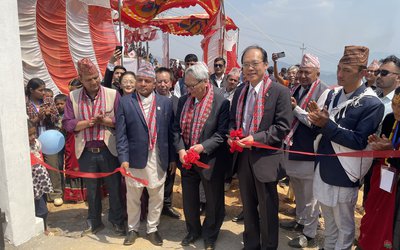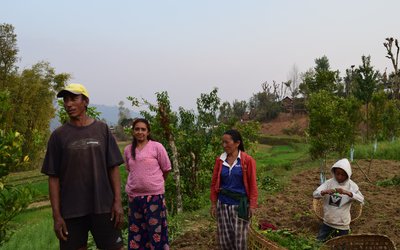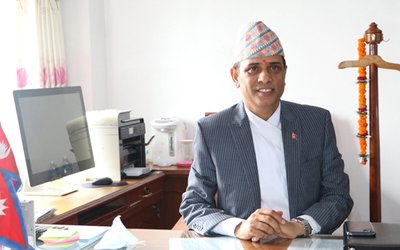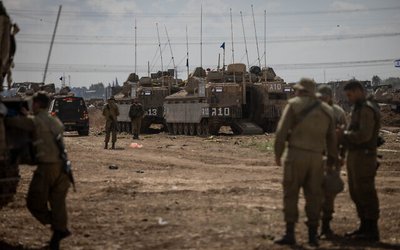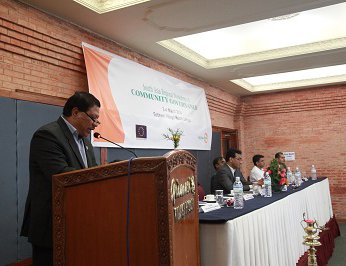
At a time when Nepal government is preparing to hold the elections to the local bodies, it was a great opportunity for Nepali officials, to share and learn about the South Asian experience at a meeting held in Kathmandu.
More than 90 participants, consisting of representatives of government bodies, donors and development agencies, diplomatic missions, civil society organizations and media from South Asia talked about the themes of community governance at the 2-day regional workshop, focusing mainly on the ways the local bodies can work to reduce poverty.
With over 3,900 Village Development Committees, 59 municipalities and 75 districts, Nepal has a strong network of local bodies involved in improving the day to day life of the local people and carry out the development activities. However, these bodies have remained without the elected representatives since 2001.
“The government is determined to hold the elections to the local bodies. We will announce the date for the elections any time soon,” said deputy prime minister and leader of Nepali Congress Prakash Man Singh, inaugurating the regional workshop. “There is the need to hold the election to make the service delivery system better at the local level.”
Organized by Practical Action Regional Office, the workshop had set its main objective in fostering community governance initiatives to reduce poverty and improve the quality of life of slum dwellers, poor and marginalized people in South Asia. “Our objective is to build the capacities of local governance systems and to mainstream participation of poor people in decision making process in infrastructure and service delivery,” said Achyut Luitel, Regional Director Practical Action. "There are over 120 small infrastructure facilities directly benefiting over 125,000 in targeted areas.”
Ambassador of Sri Lanka to Nepal W. M. Senevirathna highlighted the importance of the regional workshop in the area of community governance.
“Sri Lanka has a long history of local governance,” said Dhamma Dissanayaka-director general Rural Development and Jana Saba Ministry of Economic Development of Sri Lanka.
Others expressed similar views. “At a time when the country is heading to hold the elections, Practical Action has done a good job by holding the regional workshop in Nepal,” said Shanta Shrestha, secretary at Ministry of Federal Affairs and Local Development.
On local bodies in federal structure, India's experiences are unique. “Our local bodies are very effective to carry out service delivery and local development at the local level in a federal setup,"said Dr. P.P Balan-director, Kerala Institute of Local Administration, sharing his experiences.
With the support from European Union, Practical Action is implementing regional initiatives in promoting governance in infrastructure services. These initiatives are being implemented in Nepal, India, Sri Lanka and Bangladesh. They are largely based on the South Asia Regional agreements and arrangements like SAARC Social Charter that emphasise active and wider citizen participation in developmental decision making.
One of the objectives of the community governance initiative is to reduce poverty and improve the quality of life of slum dwellers, poor and marginalized men, women and children in South Asia. The other aim is to build the capacities of local governance systems to mainstream participation of poor and vulnerable men and women in consultative and decision making processes through developing, practicing and disseminating innovative mechanisms on community governance in infrastructure and service delivery.
As these initiatives support participatory planning and action on local infrastructure development in India, Sri Lanka, Bangladesh and Nepal, one can see tangible results of various kinds of small infrastructure such as rural roads, minor irrigation systems, flood prevention bunds, common toilets, waste management, and sanitation. “These were done through strengthened participatory planning and action processes in association with citizen groups and authorities with minimal project funds. There are over 120 small infrastructure facilities built with the project directly benefiting over 125,000 people in the targeted countries,” said Luitel.
According to Practical Action over the last few years the projects generated a number of developmental lessons, which confirmed the requirement of active community participation in local governance systems for sustainable development. It also facilitated some scaling up in some of the South Asian countries to bring the concept of community governance to the next level.
Participants discussed similar projects in Nepal, Bangladesh, Maldives and Afghanistan going on with similar initiatives and cross border sharing. In several instances, recommendations were developed in some of the countries and handed over to responsible local institutions such as Ministry of Economic Development in Sri Lanka, State Department of Panchayath Raj in India and Provincial Governments of Pakistan.
As South Asian countries have been working to alleviate poverty through the participation of the community, the sharing of views among the people representing various organizations enhanced the knowledge to make community governance more effective.
- TANAHU HYDROPOWER PROEJCT: A Significant Achievement
- Apr 15, 2024
- AMBASSADOR HANAN GODAR: Sharing Pain With A Nepali Family
- Mar 30, 2024
- VISIT OF KfW AND EIB TO NEPAL : Mission Matters
- Mar 25, 2024
- NEPAL BRITAIN SOCIETY: Pratima Pande's Leadership
- Mar 24, 2024
- NEPAL ARMY DAY: Time To Recall Glory
- Mar 15, 2024




